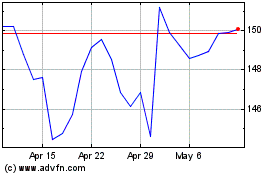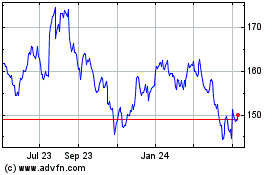By Peter Loftus
Two criminal trials of former health-care executives set to
begin in a Boston courthouse in the coming weeks illustrate what
the federal government says is a new push to hold more individuals
accountable for alleged corporate wrongdoing.
A former division president at drugmaker Allergan PLC's Warner
Chilcott unit will stand trial on a charge of conspiring to pay
kickbacks to doctors to prod them to prescribe the company's
medicines, including osteoporosis drug Atelvia.
And two former senior officers of Johnson & Johnson
medical-device unit Acclarent are charged with marketing a
sinus-opening device for a use not authorized by the Food and Drug
Administration. All three executives deny wrongdoing.
Large health-care companies have paid the U.S. government
billions of dollars -- and in some cases pleaded guilty to criminal
charges -- to resolve civil and criminal probes of their marketing
and pricing in recent years. But few executives have been on the
hook, partly because it is tough for prosecutors to prove an
individual had criminal intent in a corporate setting where
decision-making is spread among many. Antifraud activists have
pushed for more criminal prosecutions or civil lawsuits against
executives, saying corporate fines haven't sufficiently curbed
misconduct.
The Justice Department signaled its increased scrutiny of
individuals in a September 2015 memo from Deputy Attorney General
Sally Quillian Yates that made a splash in the white-collar defense
community. It laid out the various steps Justice Department
attorneys should take in their investigations to focus more on
individuals, in an effort to deter future illegal activity and
ensure "that the proper parties are held responsible for their
actions," she wrote.
Among the Justice Department's new tacks: requiring companies
under investigation to turn over all relevant information about
employees responsible for alleged misconduct, if the companies want
credit for cooperating that can knock down fines from settlements
of corporate probes. And some of the government's recent corporate
settlements of fraud allegations -- including one in April by
Pfizer Inc.'s Wyeth unit -- have provisions that explicitly don't
release individual executives from future prosecution or civil
proceedings. A Pfizer spokeswoman declined to comment.
Spokeswomen at the U.S. attorney's office in Boston and the
Justice Department declined to comment on the cases or on the
agency's efforts to target individuals.
The Justice Department effort isn't confined to health care, but
health-care fraud is one of the department's biggest areas of
focus. In the fiscal year ended Sept. 30, 2015, the Justice
Department recovered about $1.9 billion in settlements and
judgments related to health-care fraud allegations, more than half
of its total recoveries from fraud and false -- claims cases.
The increased focus on individuals has reverberated among
executives, white-collar defense attorneys say.
"When you inject into the picture a greater likelihood or
probability of individuals going to prison for responsibility for
that conduct, that obviously gets people's attention," says George
Terwilliger III, co-head of the white-collar defense practice at
McGuireWoods LLP.
Some question whether the new effort will result in a
significant increase in executive indictments, noting the Justice
Department has made similar pronouncements in the past.
Not every indictment leads to a conviction; in February, a
federal jury in San Antonio acquitted Vascular Solutions Inc. and
its CEO Howard Root of charges of selling a misbranded medical
device.
Kirk Ogrosky, a partner at Arnold & Porter LLP, says the
Justice Department has brought criminal cases against executives in
the past when it felt it had a case. "I just don't see that much of
a change," he said. It could, however, lead to more civil lawsuits
accusing individual executives of health-care fraud, he said.
In October, a grand jury indicted W. Carl Reichel, former
president of Warner Chilcott's pharmaceutical unit, on a charge of
conspiring to pay kickbacks to health-care providers between 2009
and 2011. His trial is set to begin Monday. Federal law bars
payments that are intended to cause orders for products that are
paid for by a federal health program, which prosecutors say applies
to Warner Chilcott's drugs.
Prosecutors said in court documents that Mr. Reichel, of
Chester, N.J., instructed the company's U.S. sales force to induce
doctors to prescribe Warner Chilcott drugs by taking them to
expensive dinners and paying them fees, ostensibly to give
medical-education speeches to other doctors. Prosecutors said these
speeches were more like social events, with very little talk of
medicine. In addition, prosecutors say Mr. Reichel instructed the
sales force to bring food and drink to reward physician office
staffers for submitting requests to insurance companies to pay for
prescriptions of Warner Chilcott drugs.
Mr. Reichel pleaded not guilty. In a court document, his
attorneys said there is no evidence that he intended to violate the
anti-kickback law or that he had any knowledge of doing anything
illegal. His attorney, Joseph Savage, declined to comment.
Warner Chilcott in October agreed to plead guilty to a criminal
charge of health-care fraud, and to pay $125 million to resolve a
Justice Department investigation of its payments to physicians and
other practices. Allergan PLC, formerly known as Actavis, acquired
Warner Chilcott in 2013; an Allergan spokesman declined to comment
on Mr. Reichel's case.
The second trial, set to begin June 7, is of former Acclarent
CEO William Facteau and former vice president of sales, Patrick
Fabian. In April 2015, a federal grand jury indicted them on
charges including conspiring to market a medical device for a use
not approved by the FDA, and conspiring to commit securities fraud
by not disclosing the alleged conduct to Johnson & Johnson when
it acquired Acclarent in 2010 for $785 million.
Messrs. Facteau and Fabian pleaded not guilty. Their attorneys
declined to comment. In a January video interview with Healthegy,
which operates a health-care news website and runs conferences, Mr.
Facteau said he was looking forward to his day in court, and that
"we see it differently" than what prosecutors alleged.
A J&J spokesman declined to comment.
Write to Peter Loftus at peter.loftus@wsj.com
(END) Dow Jones Newswires
May 23, 2016 02:48 ET (06:48 GMT)
Copyright (c) 2016 Dow Jones & Company, Inc.
Johnson and Johnson (NYSE:JNJ)
Historical Stock Chart
From Mar 2024 to Apr 2024

Johnson and Johnson (NYSE:JNJ)
Historical Stock Chart
From Apr 2023 to Apr 2024
